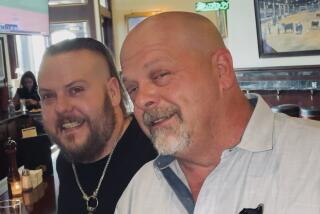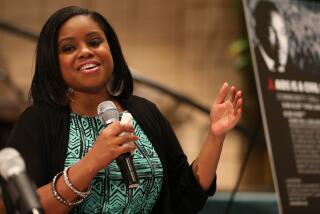Martin Delaney dies at 63; crusader for patients with AIDS
Martin Delaney, a determined crusader for HIV-infected people, who successfully challenged the U.S. Food and Drug Administration to expedite the testing and approval of potentially life-saving drugs, died of liver cancer Friday at his home in San Rafael, Calif. He was 63.
His death was announced by Project Inform, the San Francisco-based education and advocacy group he founded in 1985.
Although not HIV-positive himself, Delaney was one of the country’s most influential HIV treatment activists, whose initial intent was to examine the effect of the treatment underground that was springing up in reaction to the epidemic that was ravaging the gay community and later spread to other populations. He soon began working with federal agencies as well as with pharmaceutical companies and researchers to speed the development of beneficial therapies.
Through Project Inform, which he co-founded with psychotherapist Joe Brewer, he also established the National HIV Treatment Hotline, which fields thousands of calls a year from people in need of information about how to treat HIV infections.
“Millions of people are now receiving life-saving antiretroviral medications from a treatment pipeline that Marty Delaney played a key role in opening and expanding,” said Dr. Anthony S. Fauci, who as director of the National Institute of Allergy and Infectious Diseases is the chief government scientist responsible for AIDS research. “Without his tireless work and vision, many more people would have perished from HIV/AIDS. . . . He was a formidable activist and a dear friend.”
Delaney risked jail in the early years of his work when he helped obtain drugs from Mexico and China that were not approved by the FDA for HIV and AIDS patients. Frustrated by bureaucratic delays, he and Project Inform organized their own controversial clinical trial of an experimental drug called Compound Z in 1989. Although several patients died during the trial, the experiment proved sound enough to eventually win approval.
Largely through Delaney’s advocacy, the U.S. Public Health Service in 1990 adopted a policy allowing patients with HIV and AIDS to receive promising drugs while they are being tested for effectiveness and safety. Although conceived as a response to the AIDS threat, the policy has benefited thousands of people facing other grave diseases.
“It has become the standard,” Fauci said Monday.
Fauci was among the top scientists who initially opposed the policy change. What changed his mind, he told The Times, was a series of meetings Delaney arranged for him in the mid-1980s to meet gay men with HIV and AIDS who desperately wanted access to experimental treatments. “A lot of activists were promoting it. . . . But it was Marty who convinced me by bringing me face to face with people who actually needed it,” said Fauci, who called Delaney a public health hero.
Delaney was also close to Robert Gallo, who helped discover the AIDS virus and heads the Institute of Human Virology at the University of Maryland. In a letter last week, Gallo praised Delaney as a lay person who possessed “uncanny understanding of the science of HIV/AIDS” and was unique in “bridging the gap” between the research community and patients.
Delaney was born Dec. 9, 1945, in Chicago. He trained to become a Roman Catholic priest but dropped out of seminary to teach elementary school. He later became a management consultant with clients including IBM and Bank of America.
In 1978, after learning that he had Hepatitis B and had been given only months to live, he moved to California to participate in a clinical trial of the drug interferon at Stanford University. The treatment put him into remission. Although it left him with permanent nerve damage in his feet, he was grateful to be alive and began to ask why more patients couldn’t have access to the experimental treatment.
“He said it was better than dying,” said his sister, Lois Delaney-Ogorek of Seminole, Fla.
Delaney, who was gay, was living in Sausalito in the early 1980s when many of his friends began falling to a mysterious disease. He began to help smuggle drugs from Mexico -- including ribavirin and isoprinosine -- that were thought to have immune-boosting properties crucial to fighting AIDS.
Through Project Inform, he began holding town hall meetings across the country to share information about the effectiveness of various treatments. He also launched what he described as “medically supervised guerrilla trials” of promising drugs that AIDS patients were using despite the lack of FDA approval.
He was assailed by members of the medical research establishment for running the unapproved clinical trial of Compound Q, a drug derived from a Chinese cucumber root that had shown an impressive ability in laboratory experiments to kill cells infected with the AIDS virus. He wanted to find out as soon as possible whether the drug was safe and effective for AIDS patients. Although several people died during the trial, including a man who committed suicide, Delaney believed that the experiment showed that such trials could proceed responsibly and at a quicker pace than they had been under existing federal rules.
Explaining his rationale on the PBS show “Frontline” in 2004, he said: “It struck us as very clear and very simple that people with a life-threatening illness should have a different rule book than people in general when it comes to accessing new drugs.”
In the “Frontline” interview, he described himself as a lonelier person that he thought he would be 25 years ago. But back then he did not know that 80% of his friends would die of AIDS.
“There were times in the early 1990s where I swear that not a single day would go by in which someone I knew somewhere in the country didn’t die. . . . It’s meant, for a lot of us, devoting our lives to this work, because how could you not do so?”
In addition to his sister, Delaney is survived by three brothers, Michael, Don and Bill, all of Chicago. Plans for a memorial service are pending. Donations can be sent in his memory to Project Inform at 1375 Mission St., San Francisco, CA 94103-2621.
More to Read
Start your day right
Sign up for Essential California for the L.A. Times biggest news, features and recommendations in your inbox six days a week.
You may occasionally receive promotional content from the Los Angeles Times.







